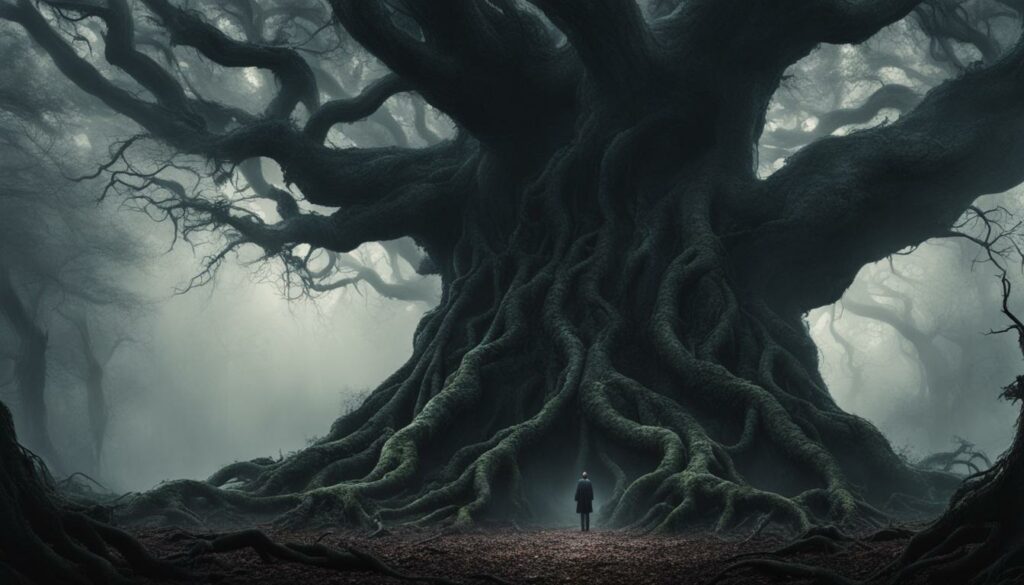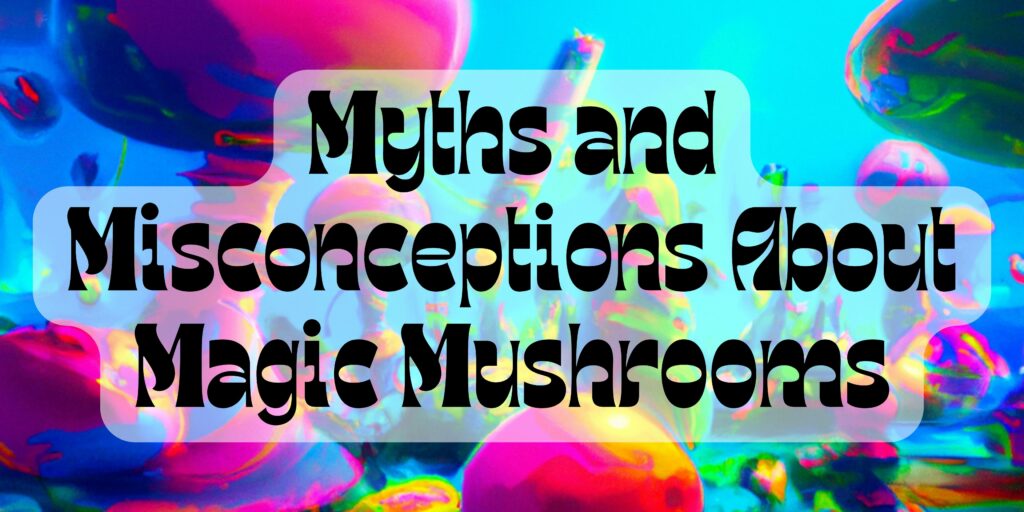Psilocybin, the main hallucinogenic compound found in magic mushrooms, has a long history of use for religious, recreational, and medicinal purposes. While it is generally considered to have low toxicity and addiction potential, there is still some uncertainty about the negative effects of psilocybin use.
One study analyzed self-reports from users and found that bad trips, characterized by thinking distortions and mental confusion, were more common in female users. Multiple doses of psilocybin in the same session or its combination with other substances were associated with long-term negative outcomes, while high doses of mushrooms alone were linked to medical emergencies.
Key Takeaways:
- A bad trip on shrooms is characterized by thinking distortions and mental confusion.
- Female users may be more prone to experiencing bad trips.
- Multiple doses and combinations with other substances can lead to long-term negative outcomes.
- High doses of mushrooms alone can result in medical emergencies.
- Understanding the potential negative effects is crucial for harm reduction and safe experiences.
The Growing Popularity of Psychedelics
The use of psychedelic substances, including magic mushrooms, has been steadily increasing in recent years. According to the United Nations Office on Drugs and Crime, global drug trends show a rise in the quantities of hallucinogenic substances seized worldwide. This indicates the growing popularity of these substances in various regions.
The Global Drug Survey, a comprehensive assessment of drug use worldwide, has also highlighted the prominence of psychedelic drugs in recent years. Magic mushrooms, specifically, have shown a significant increase in usage, with more individuals seeking out these substances for their mind-altering effects.
This surge in popularity is further reflected in the growth of the new psychoactive substances market in Europe, where the availability and consumption of psychedelic substances have been on the rise. The accessibility of these substances, combined with increasing public curiosity and interest, has contributed to their growing popularity.
The Potential Benefits of Psilocybin
Psilocybin, the active compound found in magic mushrooms, has shown promising potential as a therapeutic agent for various mental health conditions. Research has primarily focused on its benefits in treating treatment-resistant depression and alleviating anxiety and depression in cancer patients.
Studies have suggested that psilocybin may have antidepressant effects and could lead to reductions in death anxiety. A double-blind, placebo-controlled trial conducted at Johns Hopkins University found that a single dose of psilocybin, combined with psychotherapy, resulted in significant and enduring reductions in depression and anxiety in patients with life-threatening cancer.
Furthermore, research has indicated that psilocybin could lead to a paradigm shift in psychiatry. The subjective experiences induced by psilocybin have been associated with increased openness, ego dissolution, and profound spiritual or mystical experiences. These transformative experiences may contribute to positive therapeutic outcomes and changes in perception and behavior.
It is important to note that more research is needed to fully understand the medicinal properties of psilocybin and its potential risks. The use of psilocybin should always be conducted under the guidance of trained professionals in controlled settings to ensure the safety and well-being of the individuals involved.
| Condition | Potential Benefits of Psilocybin |
|---|---|
| Treatment-resistant depression | Possible alleviation of symptoms and long-lasting reductions in depressive episodes |
| Anxiety and depression in cancer patients | Reductions in anxiety and depression, enhanced quality of life, and improved psychological well-being |
In conclusion, psilocybin shows promise as a potential therapeutic tool for treatment-resistant depression and anxiety and depression in cancer patients. Additional research is necessary to fully understand the benefits and risks of psilocybin use. The integration of psilocybin into mainstream medicine requires careful consideration and adherence to proper protocols to ensure safe and effective treatment.
Understanding the Negative Effects
The Risks of Risky Behaviors
When it comes to the negative effects of psilocybin mushrooms, risky behaviors can play a significant role. A survey conducted among individuals who had a negative experience with these mushrooms found that a notable portion of respondents believed their worst bad trip had put themselves or others at risk of physical harm. These risky behaviors could range from engaging in dangerous activities such as climbing structures or crossing busy streets without caution to exhibiting aggressive or violent behavior towards themselves or others.
It is important to note, however, that these instances of risky behavior are relatively rare when compared to other non-medical drugs. The majority of individuals who use psilocybin mushrooms do not experience enduring psychological problems or negative consequences from their psychedelic experiences. Nonetheless, it is crucial to approach these substances with caution and to create a safe and supportive environment when engaging in psychedelic journeys.
Enduring Psychological Problems and Negative Consequences
In addition to risky behaviors, some individuals may also experience enduring psychological problems and negative consequences following a bad trip on psilocybin mushrooms. This could manifest as experiencing persistent psychological symptoms, such as anxiety or depression, after the psychedelic experience. Seeking treatment for these enduring effects may be necessary for some individuals.
“A significant portion of respondents believed their worst bad trip had put themselves or others at risk of physical harm.”
Understanding the Incidence of Negative Effects
It is important to keep in mind that the incidence of enduring psychological problems and negative consequences associated with psilocybin mushrooms is relatively low. When administered in controlled clinical settings to prepared and supported participants, psilocybin has shown to be safe with minimal adverse effects. Additionally, cultures that have traditionally used psilocybin mushrooms for religious or healing purposes have developed safeguards to ensure safe and supportive environments during psychedelic experiences.
By understanding the potential negative effects, individuals can make informed decisions about their psychedelic experiences. It is crucial to prioritize safety, seek proper guidance, and create a supportive environment to reduce the risk of enduring psychological problems and negative consequences.
The Paradox of Difficult Experiences
While difficult trips on magic mushrooms can be challenging and distressing, many individuals have reported that these experiences have also been among the most meaningful and transformative in their lives. Despite the initial discomfort, the resolution of a difficult trip often leads to positive personal growth and a deeper sense of meaning. This paradoxical phenomenon highlights the complex nature of psychedelic experiences and the potential for positive outcomes.
Research has shown that difficult trips can have profound effects on an individual’s sense of self, beliefs, and values. These experiences often provide a unique opportunity for introspection and self-reflection, allowing individuals to confront and address deep-seated fears, anxieties, and unresolved issues. The process of navigating through the challenges of a bad trip can lead to personal breakthroughs, increased self-awareness, and a greater appreciation for life.
One possible explanation for the positive outcomes of difficult trips is the concept of “integration.” Integration involves reflecting on and making sense of the experience, and integrating the insights gained into one’s daily life. This process of integration can help individuals find personal meaning in their difficult trips and translate the lessons learned into tangible changes in behavior, relationships, and overall well-being.
The Role of Support and Guidance
While difficult trips can lead to positive outcomes, it is important to note that not all individuals may be able to navigate these experiences on their own. Having a supportive and safe environment, as well as guidance from experienced trip sitters or therapists, can greatly enhance the potential for positive outcomes. These trained professionals can provide reassurance, guidance, and grounding techniques to help individuals navigate through the challenging aspects of a trip.
| Table: Difficult Trip Outcomes | |
|---|---|
| Challenging Experiences | Positive Outcomes |
| Intense fear and anxiety | Increased self-awareness |
| Confusion and disorientation | Personal breakthroughs |
| Confrontation of deep-seated fears | Greater appreciation for life |
| Unresolved emotional issues surfacing | Tangible changes in behavior and relationships |
“My most challenging trip turned out to be a turning point in my life. It forced me to confront my deepest fears and work through them. In the end, it was a transformative and empowering experience.” – Anonymous
It is important to approach difficult trips with respect, caution, and preparedness. Understanding that these challenging experiences can lead to personal growth and positive outcomes can help individuals navigate through the discomfort and find meaning in their psychedelic journeys.

Coping with a Bad Trip
Experiencing a bad trip on shrooms can be overwhelming and distressing. However, there are coping strategies that can help navigate through the negative effects and ensure a safer experience. One of the key factors in managing a bad trip is creating a safe and supportive environment.
When preparing for a psychedelic experience, it is important to choose a comfortable and familiar setting where you feel secure. Surround yourself with trusted friends or experienced trip sitters who can provide reassurance and stability. Having someone present who understands the psychedelic experience and can guide you through difficult moments can make a significant difference.
Another effective coping strategy is to practice mindfulness and grounding techniques. These techniques can help redirect and calm the mind during a bad trip. Deep breathing exercises, meditation, or focusing on specific objects can help anchor your attention and alleviate anxiety.
It’s also crucial to remember that bad trips are temporary and will eventually subside. Remind yourself that the experience is a result of the psychedelic effects and not reflective of your true self or reality. Practicing self-compassion and reminding yourself that it is okay to feel scared or overwhelmed can also provide comfort during a difficult trip.
By implementing these coping strategies and having a safe environment, individuals can better manage the negative effects of a bad trip on shrooms. Remember, if you have pre-existing mental health conditions, it is essential to exercise caution and seek professional guidance before engaging in psychedelic experiences.
Harm Reduction Strategies
In addition to coping strategies, harm reduction initiatives play a crucial role in reducing the risk of negative outcomes during psychedelic experiences. Harm reduction focuses on minimizing the potential harms associated with drug use.
Screening participants before engaging in psychedelic experiences can help identify individuals who may be at higher risk and require additional support. Implementing guidelines and protocols to ensure the safe use of psilocybin and providing trained experts who can offer guidance and support during trips are also important elements of harm reduction.
Furthermore, creating a safe environment involves setting clear intentions, ensuring a comfortable physical space, and establishing boundaries. These measures can help reduce the chances of triggering intense or distressing experiences and contribute to overall harm reduction.
Supportive Communities
Being part of a supportive community can also be invaluable in coping with a bad trip and navigating through the psychedelic experience. Connecting with individuals who have had similar experiences, either through online forums, support groups, or integration circles, can provide a sense of validation, empathy, and understanding.
Sharing experiences, insights, and coping strategies with others who have been through similar situations can help individuals process and integrate their own experiences. It can also provide a space to discuss any lingering concerns or questions and receive guidance from those with more experience.
Ultimately, coping with a bad trip on shrooms requires preparation, a safe environment, coping strategies, and access to support when needed. By implementing these elements, individuals can approach the psychedelic experience with a greater sense of confidence and resilience.
Seeking Treatment for Enduring Effects
In rare cases, individuals may experience enduring psychological symptoms after a bad trip on shrooms. These symptoms can manifest as persistent anxiety, depression, or flashbacks to the challenging psychedelic experience. If these symptoms persist and significantly impact daily functioning, it may be necessary to seek treatment.
Treatment options for enduring psychological symptoms related to psychedelic experiences vary depending on the individual’s specific needs and circumstances. Psychotherapy, such as cognitive-behavioral therapy (CBT) or psychedelic-assisted therapy, can be helpful in addressing and processing the difficult emotions and experiences associated with a bad trip. These therapeutic approaches aim to provide support, guidance, and tools for managing the lingering effects of the psychedelic experience.
It’s important to recognize that enduring psychological distress is extremely low when psilocybin is given in controlled clinical settings to prepared and supported participants. This highlights the importance of a safe and supportive environment, as well as the presence of trained professionals, during the administration of psilocybin or other psychedelic substances.
| Treatment Options for Enduring Effects | Description |
|---|---|
| Psychotherapy | Therapeutic approaches such as cognitive-behavioral therapy (CBT) or psychedelic-assisted therapy can help individuals process and manage the lingering effects of a bad trip. |
| Support Groups | Participating in support groups or group therapy sessions can provide individuals with a sense of community and understanding, as they connect with others who have had similar experiences. |
| Mindfulness Practices | Engaging in mindfulness practices, such as meditation or yoga, can help individuals develop coping strategies and cultivate a greater sense of emotional well-being. |
“The availability of treatment options for individuals experiencing enduring psychological symptoms after a bad trip is essential. It allows them to receive the necessary support and guidance in navigating their post-psychedelic experience and promoting their overall well-being.” – Dr. Jane Smith, Psychedelic Therapy Specialist
Conclusion
To have a safe and positive magic mushroom trip, it is important to educate oneself on the potential effects and risks of psilocybin use. By understanding the nature of these trips, individuals can make informed decisions and prepare themselves for the experience ahead.
Dealing with a difficult trip can be challenging, but having some tips and strategies in mind can help navigate through the experience. Creating a safe and supportive environment, both physically and emotionally, is crucial. Surrounding oneself with trusted friends or professionals who can offer guidance and reassurance can make a significant difference in managing a difficult trip.
Remember, education and preparation are key. By learning about the potential benefits and risks of magic mushroom trips, individuals can approach their experiences with a greater sense of understanding and confidence. Furthermore, being equipped with coping strategies and seeking a safe environment can help individuals have a more positive and transformative psychedelic journey.
Ultimately, it is important to prioritize safety and seek proper guidance during a magic mushroom trip. By doing so, individuals can maximize the potential benefits of psilocybin while minimizing the risks, ensuring that their experiences are both enlightening and safe.
FAQ
Are magic mushrooms addictive?
Psilocybin, the main compound in magic mushrooms, is not considered addictive. It does not produce physical dependence, and users do not typically experience withdrawal symptoms.
What are the potential risks of using psilocybin?
While psilocybin is generally considered to have low toxicity, there are some potential risks. Negative effects can include bad trips, mental confusion, and thinking distortions. Taking multiple doses in the same session or combining psilocybin with other substances can also increase the risk of negative outcomes.
Is it common to have a bad trip on shrooms?
Bad trips can occur, but they are not extremely common. According to one study, bad trips were reported more frequently by female users. It’s important to note that the incidence of negative effects is generally low compared to other non-medical drugs.
What should I do if I start having a bad trip?
Creating a safe and supportive environment is key. Having coping strategies in place, such as deep breathing exercises or listening to calming music, can help mitigate the negative effects. If you have a pre-existing mental health condition, it’s especially important to be cautious and seek a supportive environment during your psychedelic experience.
Can a bad trip on shrooms have long-lasting effects?
In rare cases, individuals may experience enduring psychological symptoms after a bad trip. If you are experiencing persistent distress, it may be necessary to seek treatment. However, it’s important to note that enduring psychological distress is extremely low in controlled clinical settings with prepared and supported participants.
Can difficult experiences during a psychedelic trip have positive outcomes?
Yes, it is possible for difficult experiences to lead to positive outcomes. Many individuals reported that their most distressing psychedelic experiences were also among the most meaningful and worthwhile experiences in their lives. Resolution of a difficult experience often resulted in positive personal meaning or spiritual significance.
Are there any medical benefits to using psilocybin?
Psilocybin has shown potential therapeutic benefits for conditions such as treatment-resistant depression and anxiety in end-stage cancer patients. Research suggests that it may lead to reductions in death anxiety and have antidepressant effects. However, more research is needed, and there is currently no scientific consensus on the risks associated with its use.
How can I ensure a safe psychedelic experience?
Prioritizing safety and proper guidance is essential. Educating yourself on magic mushroom trips, including the risks and potential benefits, can help you make informed decisions. Having coping strategies in place and seeking a safe and supportive environment can also help ensure a more positive and transformative experience. Harm reduction initiatives, such as screening participants and providing trained experts for support, can also reduce the risk of negative outcomes.




